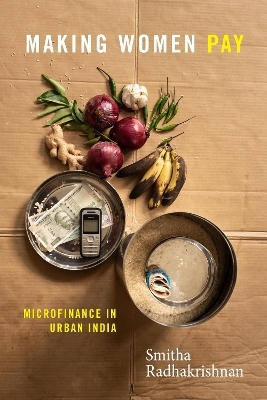
Making Women Pay
Microfinance in Urban India
Seiten
2022
Duke University Press (Verlag)
978-1-4780-1393-8 (ISBN)
Duke University Press (Verlag)
978-1-4780-1393-8 (ISBN)
Smitha Radhakrishnan explores India's microfinance industry, showing that despite the rhetoric about improving the everyday lives of women borrowers, the practice is a commercial industry that seeks to extract the maximum value from its customers.
In Making Women Pay, Smitha Radhakrishnan explores India's microfinance industry, which in the past two decades has come to saturate the everyday lives of women in the name of state-led efforts to promote financial inclusion and women's empowerment. Despite this favorable language, Radhakrishnan argues, microfinance in India does not provide a market-oriented development intervention, even though it may appear to help women borrowers. Rather, this commercial industry seeks to extract the maximum value from its customers through exploitative relationships that benefit especially class-privileged men. Through ethnography, interviews, and historical analysis, Radhakrishnan demonstrates how the unpaid and underpaid labor of marginalized women borrowers ensures both profitability and symbolic legitimacy for microfinance institutions, their employees, and their leaders. In doing so, she centralizes gender in the study of microfinance, reveals why most microfinance programs target women, and explores the exploitative implications of this targeting.
In Making Women Pay, Smitha Radhakrishnan explores India's microfinance industry, which in the past two decades has come to saturate the everyday lives of women in the name of state-led efforts to promote financial inclusion and women's empowerment. Despite this favorable language, Radhakrishnan argues, microfinance in India does not provide a market-oriented development intervention, even though it may appear to help women borrowers. Rather, this commercial industry seeks to extract the maximum value from its customers through exploitative relationships that benefit especially class-privileged men. Through ethnography, interviews, and historical analysis, Radhakrishnan demonstrates how the unpaid and underpaid labor of marginalized women borrowers ensures both profitability and symbolic legitimacy for microfinance institutions, their employees, and their leaders. In doing so, she centralizes gender in the study of microfinance, reveals why most microfinance programs target women, and explores the exploitative implications of this targeting.
Smitha Radhakrishnan is Professor of Sociology and Luella LaMer Slaner Professor of Women's Studies at Wellesley College and author of Appropriately Indian: Gender and Culture in a New Transnational Class, also published by Duke University Press.
Abbreviations and Acronyms ix
Acknowledgments xi
Introduction 1
1. The Invisible State of Gender and Credit 25
2. Men and Women of the MFI 47
3. Making Women Creditworthy 70
4. Social Work 100
5. Empowerment, Declined 124
6. Distortions of Distance 148
7. Impact Revisited 177
Conclusion 197
Methodological Appendix 211
Notes 219
Bibliography 233
Index 245
| Erscheinungsdatum | 31.01.2022 |
|---|---|
| Zusatzinfo | 11 illustrations |
| Verlagsort | North Carolina |
| Sprache | englisch |
| Maße | 152 x 229 mm |
| Gewicht | 522 g |
| Themenwelt | Geisteswissenschaften ► Geschichte ► Regional- / Ländergeschichte |
| Sozialwissenschaften ► Ethnologie | |
| Sozialwissenschaften ► Soziologie | |
| Wirtschaft ► Betriebswirtschaft / Management ► Finanzierung | |
| ISBN-10 | 1-4780-1393-1 / 1478013931 |
| ISBN-13 | 978-1-4780-1393-8 / 9781478013938 |
| Zustand | Neuware |
| Haben Sie eine Frage zum Produkt? |
Mehr entdecken
aus dem Bereich
aus dem Bereich
Erinnerungen
Buch | Softcover (2024)
Pantheon (Verlag)
16,00 €
Universalgelehrter, Polarreisender, Entdecker
Buch | Hardcover (2024)
mareverlag
28,00 €


